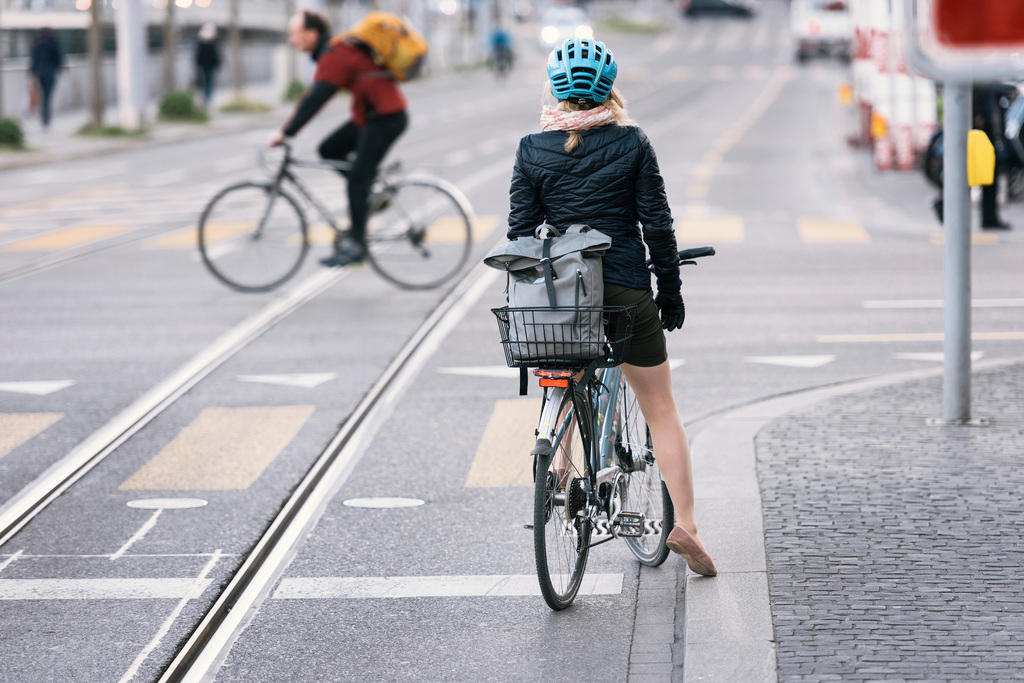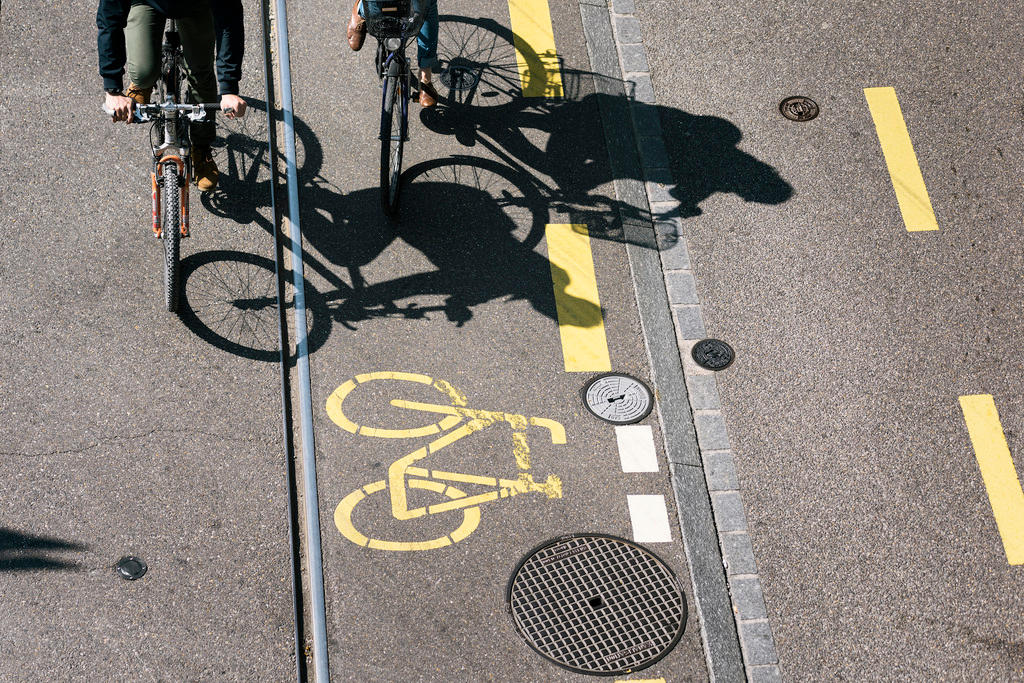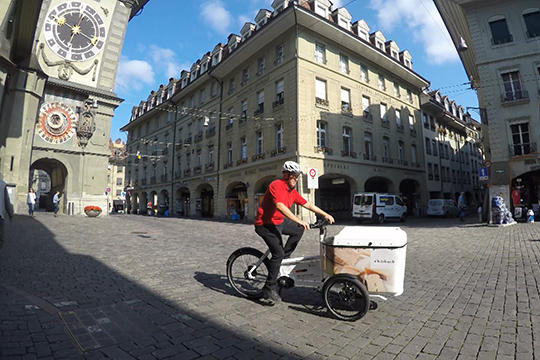Swiss to vote on enshrining cycling in the constitution

Promote bike transport and build suitable infrastructure: this is the objective of a proposal to enshrine cycle paths in the Swiss constitution, to be voted on this September 23. A necessary step, for government and parliament. The Swiss People’s Party is the sole opponent.
The article in the Swiss constitution on the principles of maintaining footpaths and hiking trailsExternal link was acceptedExternal link by the nation’s voters forty years ago. Will the current proposal to extend this article to cover bike paths have the same success at the polls?
Swiss voters will decide on September 23. But one thing is already clear: four decades later, the context is similar. This time, as before, it all began with a popular initiative, withdrawn after a government counter-proposalExternal link (in German) gathered broad-based support in parliament.
Consensus
This time, with the initiative “for the promotion of bike paths as well as footpaths and trails (bike initiativeExternal link)”, as 40 years ago with the initiative “to increase the number of footpaths and hiking trails”, the government and both houses of parliament acknowledged the validity of the goal, but not the approach to implementing it.
“Nobody on on the committee disputed the need to develop ‘slow mobilityExternal link’, in particular cycling, and thus to do something to encourage it”, said senator Raphaël Comte, rapporteur of the parliamentary study group into the initiative proposal.
The Radical Party politician from Neuchâtel pointed out that in 1977, already, during the parliamentary debate on the counter-proposal to the initiative to increase footpaths and hiking trails, the House of Representatives decided that it would also be good to include bike paths in the new constitutional article.
The Senate, however, turned the idea down. The bicycle was thus excluded from the Swissconstitution. Today that gap is considered unacceptable and in need of redress – and not just by promoters of the new “biking initiative”, but by government and parliament alike.
The government and a number of parliamentarians have pointed out the benefits of an increase in cycling as a means of transport both for work and leisure. The main advantages would be less car traffic and less crowded public transport, with a concomitant reduction in energy consumption, pollution and noise. And since riding a bicycle is exercise, this would also contribute to people’s health.

More
People’s power for pedal power
The need for safe infrastructure
Cycling is popular as a means of transport in Switzerland. According to estimates there are four million bicycles in use (the population is around eight million), and sales have remained high in the past few years.
In 2017 some 330,000 bikes were sold, an increase of 4.2% over the previous year. Nearly 90,000 of those were e-bikes; they continue to be the main growth area, surging by 16.3% that year – a new record. About two-thirds of families have either a bicycle or an e-bike.
The potential for daily commuting is far from being fully exploited, however. It is calculated that about 80% of trips by bus and tram and 50% of trips by car in the country are not more that five kilometres in length. This is a distance that could be easily covered by bike.
But to provide more incentives to switch from four-wheels to two, it’s vital to create bike paths that are safe and well-constructed, which means separate from car traffic as well as from pedestrian paths.
This is an urgent necessity not just because of the likely strong increase in traffic in coming years, but also because of the number of cyclists falling victim to accidents in Switzerland, a problem recognised by the government and a large majority of parliamentarians.
Indeed, “cycling is the only category where, since 2000, the number of people killed or injured in accidents has increased”, Transport Minister Doris Leuthard pointed out as she launched the campaign for the national vote. Part of this increase is due to the use of e-bikes.
Bern ‘must’ not, but it ‘may’
If the constitutional amendment is accepted, the government will be mandated to develop a set of principles for bike paths, as it did for footpaths and trails four decades ago.
And in its counter-proposal, the government accepted this part of the people’s initiative. But it rejected the idea that the obligation would fall on it to promote and coordinate provisions of cantons and others to create safe and attractive networks of paths, trails and bike paths, and to provide information on them “with due respect for the responsibilities of the cantons”.
In the name of federalism and respect for cantonal autonomy, Bern preferred to leave it more open – that the government “may promote and coordinate” – in the amended article. On this point, however, the mandate for the federal level to support and coordinate would be extended to cover the efforts of third parties – such as voluntary associations in the field – and to provide information on these networks of paths, as called for by the initiative.

A useless burden?
With this compromise solution, the counter-proposal passed through parliament successfully: all parties approved it, except for the conservative right Swiss People’s Party, who said that the amendment was useless and disrupts the division of powers between the government, cantons and municipalities.
“We are interfering with the sovereignty of the cantons and municipalities, and we are fixing something that already works,” said People’s Party parliamentarian Thomas Hurter. He emphasised that cantons and municipalities know exactly where they need to intervene.
“The federal government is not allowed to assume new powers that do not fall under its remit,” added party colleague Erich Hess.
For the People’s Party, it’s utopian to believe that by creating a whole network of cycling paths the use of bicycle transport will be increased. Adverse weather conditions – cold, heat, rain, snow, wind – are often a deterring factor, said Hurter. Furthermore, short daily commutes that can be easily done by bike are generally those on flat ground; that is, in the cities, where there is not much room for extension of existing infrastructure.
The final decision is up to the voters, who will be asked to say yes or no to the counter-proposal. The compromise cooked up by the government, besides winning over most of parliament, also satisfied the backers of the original initiative, who have now withdrawn their original wording so as to throw their support behind the government’s suggestion.
To pass, it needs a double majority on September 23: an overall majority of voters and a majority of the cantons.
Translated from Italian by Terence McNamee, swissinfo.ch

In compliance with the JTI standards
More: SWI swissinfo.ch certified by the Journalism Trust Initiative













You can find an overview of ongoing debates with our journalists here . Please join us!
If you want to start a conversation about a topic raised in this article or want to report factual errors, email us at english@swissinfo.ch.